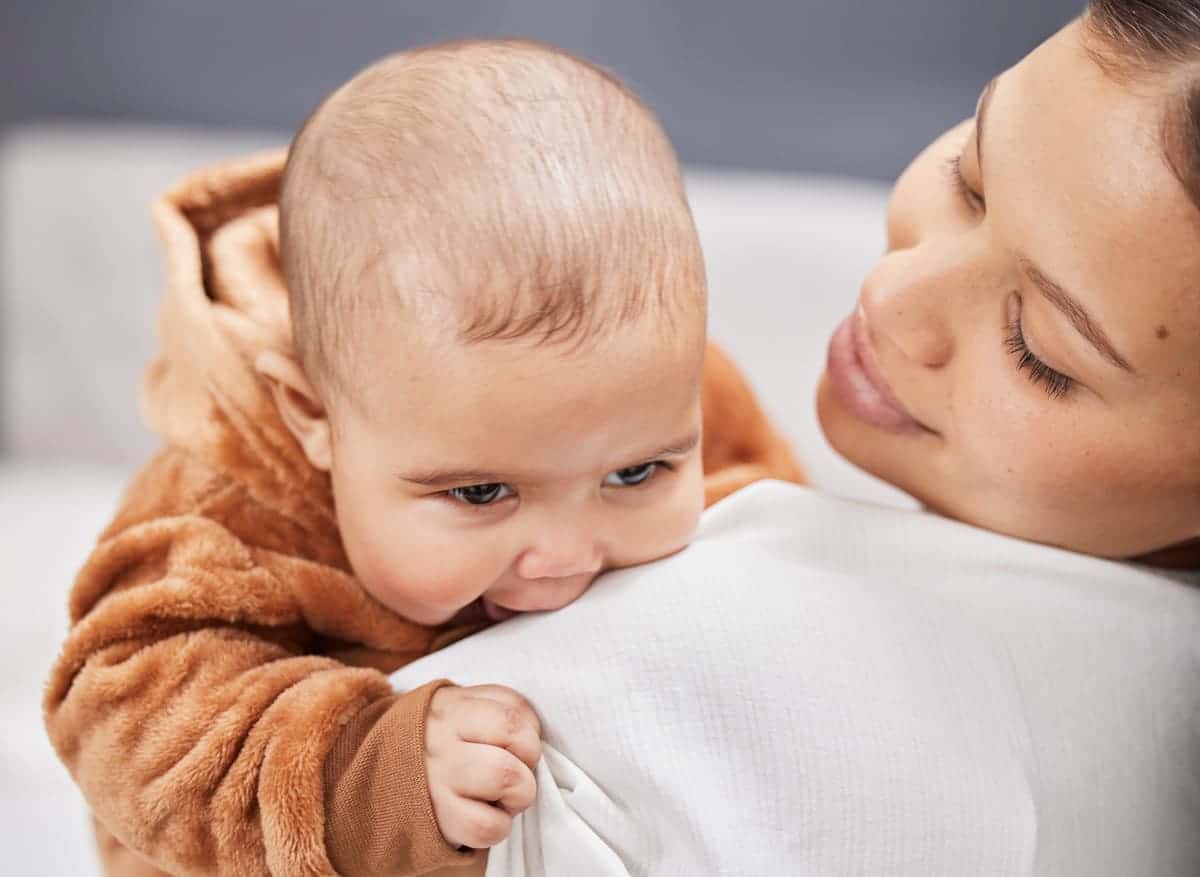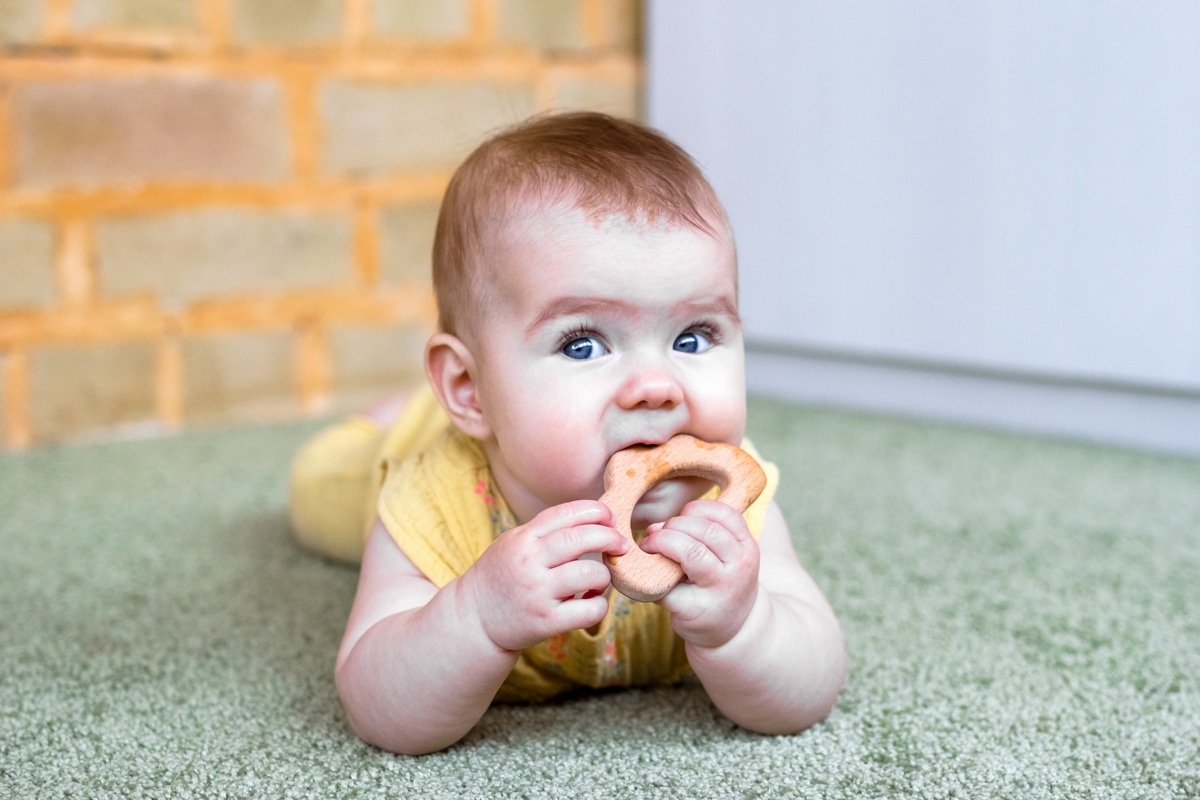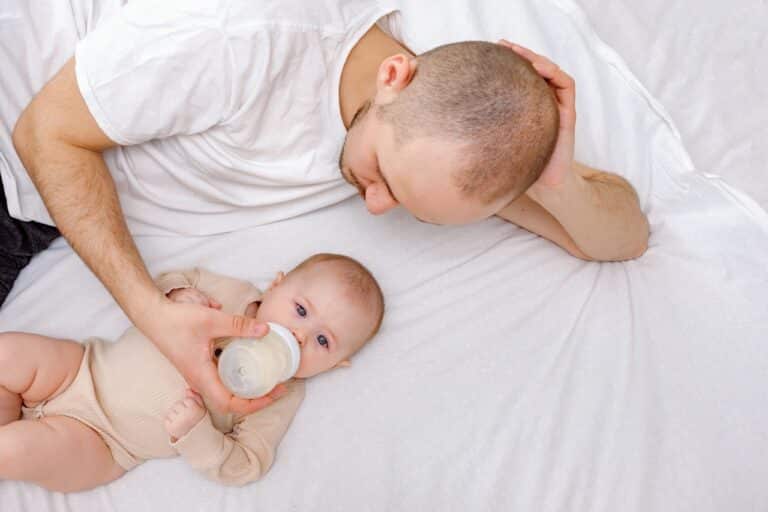Teething is a pivotal milestone in your baby’s development, marking the emergence of their first little pearly whites. As parents, we eagerly await the arrival of this milestone but also dread the discomfort and fussiness that often accompany it. It’s common for babies to start teething between 4 and 7 months of age, but every baby is unique and may experience teething at different times. In this article, we’ll delve into the details of when babies typically start teething and what signs to look out for. So scroll down to learn more!
Key Takeaways:
- Most babies start teething between 4 and 7 months of age.
- Some babies may start teething as early as 4 months or as late as 9 months.
- Every baby is different, so there’s no need to worry if your baby doesn’t start teething at the expected time.
- Teething can cause discomfort and fussiness, but there are ways to soothe your baby’s pain.
In This Article
What is teething?
Teething is the process in which your baby’s first tooth, also known as deciduous teeth or “milk teeth”, starts to emerge from the baby’s gums. It usually begins with the two bottom front teeth, followed by the four upper front teeth and then the molars. By the time your little one turns 6 months of age, they will likely have around 2 teeth, with more appearing gradually over time.

When does teething start?
Teething is a significant milestone in a baby’s growth, marked by the appearance of their first tooth. As mentioned earlier, most babies start teething between 4 and 7 months of age. This is the average age when most babies get their first tooth, usually one of the lower central incisors, the two front teeth on the bottom.
However, the timing can vary significantly. Some babies may start teething as early as two or three months, while others may not begin until they are a year old. By the time a baby reaches 12 months old, they usually have between two to four baby teeth. The process continues until about three years of age, by which time most children have all twenty of their primary, or “baby”, teeth.
It’s important for parents to remember that each child’s teething timeline is unique, and it’s perfectly normal if a baby’s teeth come in earlier or later than this general timeline. As long as your baby is teething by 12 months and has all twenty teeth by age three, there is no reason for concern.
Early Signs and Symptoms of Teething
Teething symptoms can vary from baby to baby, and not all babies experience the same level of discomfort during teething. Some babies may go through the entire tooth decay process without showing any signs at all, while others may be quite bothered by their emerging teeth. Typically, one or two of the following signs of teething are common:
- Drooling: Teething stimulates saliva production, so you may notice that your baby is drooling more than usual.
- Gnawing and chewing: The pressure from a tooth breaking through the gums can be relieved by chewing on hard objects, so you may notice your baby gnawing on their fingers, toys, or other objects.
- Irritability and fussiness: Teething pain can cause discomfort and irritability in some babies. They may cry more than usual or seem overall more fussy.
- Changes in eating and sleeping patterns: Discomfort from teething can make it difficult for a baby to eat or sleep as they usually do.
- Red and swollen gums: As a child’s teeth push through the gums, the gum tissues may become red, swollen, and tender to the touch.
- Low-grade fever: Some babies may experience a slight increase in body temperature during teething. However, if the fever is higher than 101°F (38.3°C) or lasts longer than three days, it’s best to consult a doctor.
- Ear pulling and cheek rubbing: Teething pain can sometimes be felt in other areas of the face, leading babies to pull at their ears or rub their cheeks.

How to Soothe a Teething Baby?
Teething can be a challenging and uncomfortable experience for both babies and parents. Here are some tips and techniques that can help alleviate your baby’s discomfort:
- Gentle Gum Massage: With clean hands, gently massage your baby’s gums to ease the discomfort. This can often provide immediate relief and soothe your baby’s aching gums.
- Teething Rings: Teething rings are safe and effective tools for a teething baby. They provide something firm for the baby to chew on, which can help soothe their sore gums. Ensure the teething ring is made of baby-safe, BPA-free material.
- Cold Items: Chilled items can provide great relief for a teething baby. A cold teething ring or a damp washcloth chilled in the refrigerator can numb the gums and alleviate pain.
- Maintain Oral Hygiene: Once the first tooth appears, it’s important to care for your baby’s teeth by brushing them twice a day with a soft, small-bristled toothbrush and a tiny smear of fluoride toothpaste.
- Consultation with Pediatric Dentist: Schedule a visit to a pediatric dentist when the first tooth appears or by your baby’s first birthday. According to the American Academy of Pediatrics, this early visit can help parents learn about proper oral health and early intervention if any issues arise.
- Over-the-counter remedies: Some over-the-counter pain relievers or teething gels designed for infants may also be considered. However, always consult your pediatrician before administering these.
When to Consult a Pediatrician?
Teething is a natural process that all babies go through as their first teeth begin to emerge. However, it’s important to know when teething symptoms might indicate a need for medical attention. While some discomfort and fussiness are typical, certain signs should prompt a consultation with a pediatrician. If your baby has;
- High fever
- Diarrhea or vomiting
- Excessive crying and irritability
- Refusal to eat or drink anything for an extended period
- Rash or other skin irritation around the mouth and chin area
It’s best to seek medical advice. These symptoms may be caused by something other than teething, and it’s essential to rule out any underlying health issues. It is medically reviewed that permanent teeth begin to appear around age six, so if your baby is older than 12 months and has not started teething, it’s also a good idea to consult a pediatrician.
Conclusion
To sum it up, babies’ teeth appear at age 4-7 months, and it continues until about three years of age. While teething can be a challenging experience for both babies and parents, there are ways to soothe your baby’s discomfort to make the process more manageable. Remember, every child’s teething timeline is unique, so there is no need to worry if your baby’s teeth come in earlier or later than expected. However, if you notice any concerning symptoms during teething, it’s always best to consult a pediatrician for proper medical advice and guidance. So, embrace this milestone with patience and care, knowing that it’s a natural part of your baby’s development.
FAQs
Is teething really painful for babies?
Yes, teething can be uncomfortable for babies as the new teeth push through the gums, causing irritation and soreness. However, the level of discomfort varies for each baby. Some might experience slight discomfort, while others may seem more distressed.
Do babies sleep more when teething?
No, teething can actually disrupt a baby's sleep due to the discomfort and irritation it causes. Some babies may wake up frequently at night and have difficulty settling down. However, each baby's response to teething can vary.
What does an erupting tooth look like?
An erupting tooth often causes the gums to bulge and appear red or even bluish due to a buildup of fluid called a teething blister or eruption cyst. The new tooth may be visible under the swollen area of the gum.
Do teething necklaces actually work?
While some believe that amber teething necklaces can relieve teething pain due to succinic acid in Baltic amber, there is no scientific evidence to support these claims. Moreover, these necklaces can pose a choking risk to babies.
Reference:











